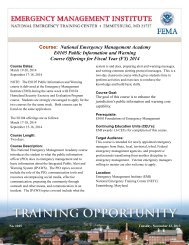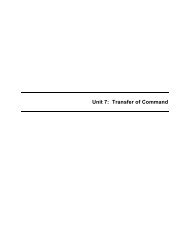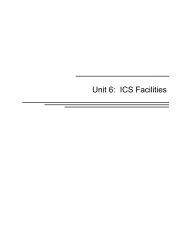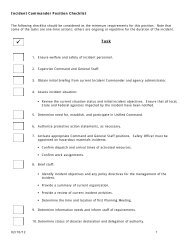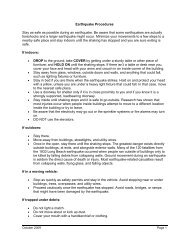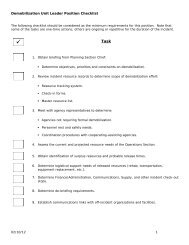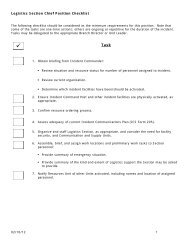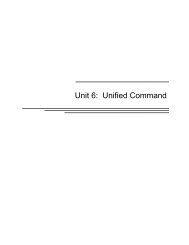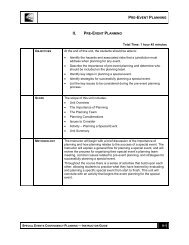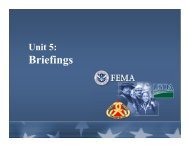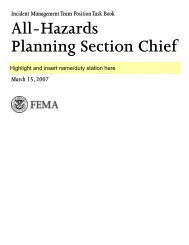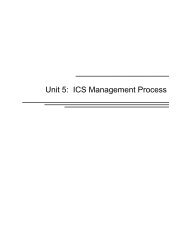Reputation and Federal Emergency Preparedness Agencies, 1948
Reputation and Federal Emergency Preparedness Agencies, 1948
Reputation and Federal Emergency Preparedness Agencies, 1948
You also want an ePaper? Increase the reach of your titles
YUMPU automatically turns print PDFs into web optimized ePapers that Google loves.
Traditional models ascribe bureaucratic power either to the structural characteristics of an<br />
agency or to a blurring of the lines between the interests of political appointees charged with<br />
setting policy <strong>and</strong> the interest of career civil servants. In these models characteristics of<br />
bureaucratic power include an agency’s size, ties to interest groups <strong>and</strong> congressional<br />
committees (iron triangles), information asymmetries, <strong>and</strong> political appointees who “marry the<br />
natives” <strong>and</strong> adopt the preferences of career civil servants, <strong>and</strong>, finally, self-interested behavior<br />
such as shirking or budget maximization (Golden 2000; Heclo 1977; Meier 1993; Meier,<br />
Wrinkle, <strong>and</strong> Polinard 1995; Niskanen 1971; Wilson 1977). FEMA, however, is not a<br />
particularly large agency, with only about 3,000 employees, nor are its core tasks top secret <strong>and</strong><br />
immune to routine political meddling, like those of the intelligence agencies. FEMA lacks<br />
powerful, organized interests groups like the kind that support the Environmental Protection<br />
Agency <strong>and</strong> it also lacks the Department of Defense’s powerful connections to private industry.<br />
The most thorough recent attempt to explain bureaucratic autonomy is by Daniel<br />
Carpenter (2001, 364-65) who locates the source of agency power in reputation. Carpenter<br />
defines reputation as an “evolving belief” among the politicians <strong>and</strong> the public—<strong>and</strong> especially<br />
organized interests—in the ability of an agency to anticipate <strong>and</strong> solve problems. <strong>Reputation</strong> may<br />
adhere to a single agency, a small set of agencies or, in part, to a bureaucratic entrepreneur who<br />
leads an agency. 5 Carpenter locates the roots of bureaucratic autonomy, essentially agencies’<br />
sustained discretion, in a strong reputation supported by innovative bureaucratic actors <strong>and</strong><br />
organized social groups or “coalitions of esteem” (Carpenter 2000, 122). 6 Progressive era<br />
expansion of the Post Office was supported by moral reform groups including prohibitionists.<br />
These networks outlasted politicians’ attempts to co-opt them, since they spanned the usual<br />
partisan <strong>and</strong> class boundaries. Today, however, the rich associational life of the progressive era<br />
has given way to pervasive individualism so that America is not the nation of joiners it once was<br />
(Putnam 2000). Powerful interest groups located in Washington largely replaced the more<br />
organic local associations; belonging to a modern interest group requires no more commitment<br />
than writing a check.<br />
I define reputation in much the same way as Carpenter: it is the development of a belief<br />
among politicians <strong>and</strong> the public in an agency’s ability to anticipate <strong>and</strong> address the public’s<br />
needs. Where I differ is in the explanation for the manner in which a modern agency develops a<br />
reputation. Contemporary agencies require different ingredients. First, contemporary agencies<br />
can develop a reputation with a connection to a mature profession, which helps to compensate<br />
for the support <strong>and</strong> information once provided by progressive era associations. In addition,<br />
modern agencies are required to perform increasingly complex technical tasks, <strong>and</strong> a<br />
professional culture, with its knowledge, training, <strong>and</strong> own set of academic <strong>and</strong> political<br />
associations, can provide the agency with important expertise.<br />
<strong>Reputation</strong> is useful in underst<strong>and</strong>ing how contemporary agencies become powerful over<br />
time. My argument is that FEMA was able to resist the comm<strong>and</strong>s of its political principals<br />
because the agency had developed a reputation as an effective disaster agency, not as a<br />
5 From Carpenter (2001, 13, 364-65). The concepts of reputation <strong>and</strong> autonomy are developed in Carpenter (2000, 2001). The<br />
sociological literature has made attempts to underst<strong>and</strong> the role of ideas in organizations, including Finnemore (1996); DiMaggio<br />
<strong>and</strong> Powell (1983). In political science, the comparative politics field has had a resurgence of scholarship on ideas in politics,<br />
including Goldstein (1993).<br />
6 Carpenter’s work defines bureaucratic power, <strong>and</strong> specifically “autonomy,” as those occasions in which “elected authorities see<br />
it as in their interest to either (1) defer to an agency’s wishes for new policy or (2) grant a wide range of discretion to an<br />
administrative agency over an extended period of time” (Carpenter 2000, 124). My own concern is less with the creation of new<br />
programs—after all, much of the radical policymaking of the contemporary era involves eliminating programs—than with an<br />
agency’s ability to define its mission <strong>and</strong> core tasks.<br />
<strong>Reputation</strong> <strong>and</strong> <strong>Federal</strong> <strong>Emergency</strong> <strong>Preparedness</strong> <strong>Agencies</strong>, <strong>1948</strong>-2003 3



